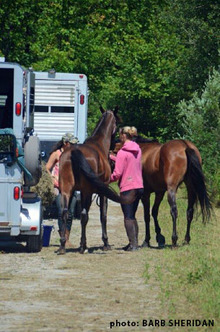Heâs an old friend. A companion youâve had for years with whom you have overcome challenges that have made you the team you are today. The aging process affects all horses, especially those traveling to shows and trail rides may face even more geriatric problems. USRider takes a look at how to keep your older equine partner safe and happy while on the road.

Tips for keeping horses healthy on the road
The aging process affects all horses, especially those traveling to shows and trail rides may face even more geriatric problems. USRider takes a look at how to keep your older equine partner safe and happy while on the road.
© 2015 by Barbara Sheridan
What if my horse doesnât act his age and still has that 6-year-old charm? Even so, traveling can cause wear to any animal and old age plays a big part of that. Along with joints that arenât what they used to be, older horses fall victim to weaker kidneys, higher risk of colic and respiratory problems.
One top priority, especially if you are headed to a destination hundreds of miles away, is that your first aid kit is well supplied and up to par with your horseâs needs. Be prepared.
While traveling, it is important to keep your older horse on his normal feeding schedule. There is a higher risk of colic because the horse is standing in one place rather than moving around. To lower this risk significantly, stop every 2-3 hours to exercise and water your horse.
Leg protection during travel is important for any horse. Geriatric horses call for extra protection due to a lack of balance and stability. It is important to wrap your horseâs legs with shipping boots that extend over the knees and hocks. This is not to be confused with leg wraps as they can be too tight and cause a lack of circulation and weakening of tendons.
While no horse can see the brake lights of the person in front of you or those tight switchback turns, horses that are younger and more limber have a better ability to brace for a hard brake or tight turn, whereas an older horse may lose balance and fall. So take extra caution and double up on that space with the car in front of you.
Hydration plays a big role in keeping your companion healthy while traveling. Without the proper intake of water, horses (not just older) can experience muscle tremors and weakness. This is due to a loss of potassium and other electrolytes.
Like you, horses need these to keep up energy and standing in a trailer for a long period of time can immensely increase the need for water. Problem: You present him with a bucket of water and he turns up his nose (literally). It doesnât have the same smell as the water at home, therefore is foreign.
Solution(s): You can add salt to the feed to increase thirst; or, you can add Gatorade or a soda to make the water sweeter. Some people who travel with horses who add a sweetener to their water swear by this method. Their horses have become used to this type of water only when traveling making it a âcomfort beverageâ, if you will.
A good key note to eliminate respiratory problems is to have your trailer well ventilated even in cooler temperatures. Horses can only cool themselves by sweating, thus demanding the further need for water. Ventilation is very important to keep fresh air coming in and pushing toxic air out.
USRider â in its 13th year of operation â is the only company to provide emergency roadside assistance for horse owners. Through the Equestrian Motor Plan, USRider provides nationwide roadside assistance and towing services along with other travel-related benefits to its Members.
The plan includes standard features such as flat-tire repair, battery assistance, lockout services, and roadside repairs for tow vehicles and trailers with horses, plus towing up to 100 miles. As an additional service, USRider maintains a national database that includes emergency stabling, veterinary and farrier referrals.
For more information about the USRider Equestrian Motor Plan, visit www.usrider.org online or call (800) 844-1409. For additional safety and travel tips, visit the Equine Travel Safety Area on the USRider website at www.usrider.org.
